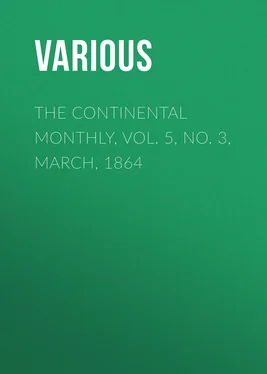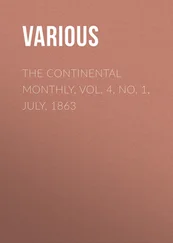Various - The Continental Monthly, Vol. 5, No. 3, March, 1864
Здесь есть возможность читать онлайн «Various - The Continental Monthly, Vol. 5, No. 3, March, 1864» — ознакомительный отрывок электронной книги совершенно бесплатно, а после прочтения отрывка купить полную версию. В некоторых случаях можно слушать аудио, скачать через торрент в формате fb2 и присутствует краткое содержание. Жанр: foreign_antique, periodic, Языкознание, Политика, foreign_edu, на английском языке. Описание произведения, (предисловие) а так же отзывы посетителей доступны на портале библиотеки ЛибКат.
- Название:The Continental Monthly, Vol. 5, No. 3, March, 1864
- Автор:
- Жанр:
- Год:неизвестен
- ISBN:нет данных
- Рейтинг книги:3 / 5. Голосов: 1
-
Избранное:Добавить в избранное
- Отзывы:
-
Ваша оценка:
- 60
- 1
- 2
- 3
- 4
- 5
The Continental Monthly, Vol. 5, No. 3, March, 1864: краткое содержание, описание и аннотация
Предлагаем к чтению аннотацию, описание, краткое содержание или предисловие (зависит от того, что написал сам автор книги «The Continental Monthly, Vol. 5, No. 3, March, 1864»). Если вы не нашли необходимую информацию о книге — напишите в комментариях, мы постараемся отыскать её.
The Continental Monthly, Vol. 5, No. 3, March, 1864 — читать онлайн ознакомительный отрывок
Ниже представлен текст книги, разбитый по страницам. Система сохранения места последней прочитанной страницы, позволяет с удобством читать онлайн бесплатно книгу «The Continental Monthly, Vol. 5, No. 3, March, 1864», без необходимости каждый раз заново искать на чём Вы остановились. Поставьте закладку, и сможете в любой момент перейти на страницу, на которой закончили чтение.
Интервал:
Закладка:
Our Government proposes to recover lost possessions, and restore the integrity of the Union. Wherefore? Ours is the most beneficent Government upon the earth, blessing the most human beings, and it should be sustained. The whole nation has contributed to the acquisition of Southern territory, and it is not meet that the Northern people should surrender their interest in the same. The Mississippi River belongs as naturally to the great West as to the South, and it should be under the control of the same sovereign power, to be used for the good of one great people. There is no natural division line between the North and South, and it would be fatal to the future peace and prosperity of this continent to attempt to make one.
These are some of the reasons ordinarily given for the prosecution of this war—for our great effort to reëstablish the Union. They are practical, readily comprehended, and to urge them is well—enough, really, for present practical purposes; but may there not be in the idea of political unity a meaning—a philosophical significance, if you please, which these practical and obvious considerations do not reveal?
It is the confirmed conviction of the Northern people, with certain unnatural exceptions, that it is our true policy to maintain the integrity of the Union at any cost, however great; the people of the South evidently take a different view of it; the political thinkers of Europe appear to be divided in their sympathies between the North and South.
An article appears in a British quarterly to prove that it is the fate of great empires to fall to pieces; and that China, Turkey, Russia, and the United States show signs of approaching dissolution. It is observed that French writers of authority in the Government have issued pamphlets to prove that the peace and stability of nations require the dismemberment of the United States. The 'fire eaters' of the South are not the only people who would like to see the United States in fragments. We have such even in the North; and in Europe, especially near the thrones, 'their name is legion.'
The thinking world has not yet settled into the conviction that a great continental policy, preserving internal peace, and enduring for an indefinite period into the far-off future, is a possible thing. The fate of nations and empires, as revealed in history, is apparently against such an idea. Many empires have already appeared, risen to power, fallen into decay, and become dismembered, having run their course and disappeared. May it not be so with our own great confederacy of States? The authority against a great, practical, enduring political unity is respectable. May we not be fighting for an illusion? What guarantee have we in history, science, and common sense, that our Federal Union will not crumble as the empires of the past have done, and as the political prophets of Europe, casting the horoscope of nations in the shadows of their own political fragmentarism, have predicted for us? Even should the rebels South be chastised, and the Union restored for the present, have we solid reasons for believing in the permanency of our institutions? What is the warrant for our faith that American destiny comprehends the principle of American unity?
People contract habits of thought in a great measure from the nature of the institutions which surround them. Europe could think nothing but feudalism at one time; she had no conception of religion outside the Church of Rome. The Turk thinks by the standard of political absolutism and the Moslem faith. The reflections of every people are cast in the national mould; it is so the world over, and has been so in all times. Europe, or at least a very influential portion thereof, thinks that the 'balance of power' system will yet be inaugurated among the family of nations yet to spring up on this continent. Her people think balance of power, and the London Times and like organs of the existing polity write balance of power for our edification, and for the future of America. They cannot conceive that there is any other way to get along for any considerable length of time. In like manner is it concluded—keeping up the old trains of thought—that if nations once fell into fragments when shaken, they will do just so again.
Now, perhaps we have contracted habits of thought from the character of our country and her institutions, and are deceiving ourselves with hopes which have no real foundation. These, we believe, are considerations which have engaged the attention of every reflecting man; and it behooves us, as intelligent Americans and members of a young nation of hitherto unexampled prosperity and promise, to be able to give a reason for the faith that is in us.
There are changes and crises in the course and destiny of political systems. The conditions of one period of time are different from the conditions of another period. Different conditions necessitate different political systems. Feudalism did not last always; European diplomacy is only three hundred years old. If Europe, out of her peculiar situation, originated the doctrine of balance of power, thus innovating upon the past, may not we, owing to the novelty of our situation, originate a continental system which will endure to the remotest periods of time, or so long as political systems shall have place on the earth?
One empire may fall into fragments to-day; while another may not only not suffer dissolution, but really grow stronger, and appropriate, in a most legitimate manner, parts of the dismembered empire.
We must allow, not only for the difference of conditions with reference to time, but, also, for the different situations at the same time of different political structures. To assume, because nations have been ground to atoms, or have fallen to pieces of their own weight, that therefore Russia and the United States are about to go in the same way, is a species of reasoning which is hardly warranted by scientific methods. It may be that the empire of Great Britain is itself doomed to dissolution at no very distant day; but it does not follow that the United States are, therefore, liable to the same fate, now or ever. So far from this, it is possible, if not highly probable, that as the remote provinces of the British empire shall fall away, the central political system of this continent may very naturally absorb at least one of the fragments, and thereby become stronger as a Government, and more potent for good to the people of an entire world.
There are laws of dissolution, and laws of segregation and combination in the political as in the natural world. Great Britain may fall into fragments because her geographical and political conditions render her amenable to the laws of dissolution; while the United States may go on enlarging their boundaries and becoming more stable and powerful from the fact that their political status and local surroundings render them the legitimate subject of the laws of political growth and geographical enlargement. The British possessions are geographically too remote; they may not be united together by the necessary bonds of political union. The weakness of Great Britain may now be what the weakness of the Spanish empire once was. Her geography is against her. The day is gradually passing away when arbitrary power may hold distant regions in subjection to a central despotism; the day is at hand which demands that the bonds of union shall be natural and just, not arbitrary—bonds which forever assert their own inherent power to unite and grow stronger, not weaker, with the inevitable changes constantly being wrought out by the busy hand of time.
Man's social and political life depends much on the physical conditions by which he is surrounded. We have only to instance a mountain and valley population. The former is isolated and out of the way, and the people simple, uncouth, and uncultivated—contented, it is true, but, nevertheless, enjoying but little of the abundance and variety in which people of culture luxuriate. The valley population have a city, villages, rich lands, trade, and commerce; they are wealthy, cultivated, and realize far more the legitimate fruition of our entire nature.
Читать дальшеИнтервал:
Закладка:
Похожие книги на «The Continental Monthly, Vol. 5, No. 3, March, 1864»
Представляем Вашему вниманию похожие книги на «The Continental Monthly, Vol. 5, No. 3, March, 1864» списком для выбора. Мы отобрали схожую по названию и смыслу литературу в надежде предоставить читателям больше вариантов отыскать новые, интересные, ещё непрочитанные произведения.
Обсуждение, отзывы о книге «The Continental Monthly, Vol. 5, No. 3, March, 1864» и просто собственные мнения читателей. Оставьте ваши комментарии, напишите, что Вы думаете о произведении, его смысле или главных героях. Укажите что конкретно понравилось, а что нет, и почему Вы так считаете.












